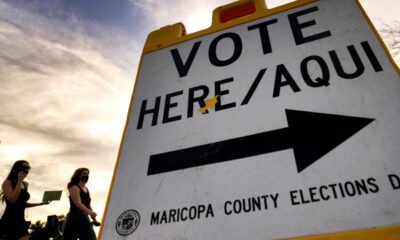arizona
Heftier GOP Majorities in Arizona Legislature Threaten Democratic Governor’s Ambitions

Republican gains in the Arizona Legislature signal a challenging road ahead for Gov. Katie Hobbs and her Democratic agenda. Initial hopes of flipping legislative chambers have turned into a stark reality as Republicans have broadened their majority, eliminating even moderate voices willing to collaborate with Democrats.
This shift mirrors a broader national trend, as Republicans made significant gains during recent elections. Despite Democrat Ruben Gallego’s narrow victory in the U.S. Senate race, the GOP reclaimed ground that had previously shifted toward Democrats, underscoring a potential “red wave” in Arizona.
GOP strategist Barrett Marson suggests that Hobbs may face substantial barriers to enacting her policies. “She’ll need to navigate working with a more conservative Legislature,” he warns, implying that some compromises may be necessary for her reelection ambitions.
During this election cycle, Hobbs actively campaigned to secure Democratic successes, raising over $500,000 and rallying volunteers for advocacy efforts. However, her support did not translate into victories, with Republican Shawnna Bolick defeating Hobbs-backed Judy Schweibert in a state Senate race.
With an eye on the future, House Speaker-elect Steve Montenegro confirmed that the GOP intends to prioritize conservative issues, such as school choice and border security. He stated that the recent results reflect a disconnect between Hobbs’ policies and the preferences of Arizona voters.
Under Hobbs, attempts to push her policy initiatives have frequently stalled, evidenced by unsuccessful efforts to curb the expansion of the school voucher program. In the last legislative session, a mere $2.5 million reduction was made to that program amidst mounting budgetary concerns.
Montenegro highlighted the disappointing results for Democrats, asserting that their significant expenditures yielded no returns in terms of legislative control. He noted that Republicans remain resolute in their approach, dismissing Hobbs’ narratives as out of touch.
The Republican shift has also resulted in the loss of moderate voices among party ranks, complicating Hobbs’ ability to garner bipartisan support. Democratic strategist DJ Quinlan criticized Montenegro’s hardline stance, predicting a rise in socially conservative bills targeting issues such as reproductive rights and LGBTQ+ rights—challenges likely to face vetoes from Hobbs.
With a more Republican-dominated Legislature, Hobbs may need to leverage her executive authority more aggressively to implement her agenda. Recent actions, like initiating groundwater regulations in rural Arizona, hint at a strategic pivot towards executive executive decision-making.
Hobbs’ previous two years have seen her veto numerous Republican-sponsored bills, including those affecting transgender students and gun control measures. Going forward, observers, including Marson, anticipate a ramp-up in vetoes as Hobbs asserts her leadership against an increasingly resistant Legislature.
Commenting on the implications of advertising on the political landscape, Sam Paisley from the Democratic Legislative Campaign Committee noted the challenges posed to down-ballot candidates, stating that high-profile races often overshadow legislative contests. This dynamic has left Democratic candidates struggling for visibility and support.











![Bryan Merritt, 36, was arrested June 26 after allegedly trying to break into his estranged grandfather’s home in Homestead. [PCSO]](https://arizonanews.org/wp-content/uploads/2025/07/Break-In-or-Breakthrough-Man-Arrested-During-Family-Reunion-Gone-Awry-80x80.jpeg)



